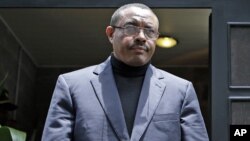ADDIS ABABA —
Ethiopia says it will support Somalia by re-establishing the country's institutions and training its defense forces. These promises were made during the first state visit of Somalia’s newly elected president to Ethiopia. New Somali President Hassan Sheikh Mohamud met with Ethiopian Prime Minister Hailemariam Desalegn on Wednesday in the Ethiopian capital, Addis Ababa.
Hailemariam pledged Ethiopia’s support to rebuild the neighboring country, which has endured more than 20 years of chaos and war.
“Ethiopia, with our experience in institution building for the last twenty years, we are ready to support the Somali government and civil service reforms... So we need to re-establish with the Somali government these institutions together, with the little capacity but with strong desire," said Hailemariam.
Somalia has requested help in rebuilding its institutions because the new government is setting up a federation, which is the governing system also used by Ethiopia.
Hailemariam further promised support for Somalia’s agriculture sector by sending professionals to help restart production.
Ethiopia will also train officers of Somalia’s defense force. Somali President Mohamud says security remains a prime concern for the country.
“Security is the first and foremost priority of Somalia, and then followed by judiciary system and the public finance management," said Mohamud. "These three are the top priority, but security has been and is the priority number one for Somalia.”
President Mohamud said he believes the militant group al-Shabab is defeated and that their fighters are on the run. Ethiopia helped African Union and Somali government forces retake major Somali cities and towns from the Islamist group.
Mohamud said his government is looking at ways of reintegrating al-Shabab fighters into society. But the president reminded non-Somali al-Shabab fighters that there is no place for them in his country.
"As a Somali government, we have no relationship and we don’t have one and we do not intend to have on with the foreign fighters in Somalia," said Mohamud. "The only option open for them is to leave the country, to let them go where they come from. If they don’t go, then its our responsibility to create an environment that makes them go.”
Ethiopian forces are still deployed in parts of Somalia to fight al-Shabab and secure stability. Ethiopia’s troops are expected to remain in those areas until African Union troops take over.
Hailemariam pledged Ethiopia’s support to rebuild the neighboring country, which has endured more than 20 years of chaos and war.
“Ethiopia, with our experience in institution building for the last twenty years, we are ready to support the Somali government and civil service reforms... So we need to re-establish with the Somali government these institutions together, with the little capacity but with strong desire," said Hailemariam.
Somalia has requested help in rebuilding its institutions because the new government is setting up a federation, which is the governing system also used by Ethiopia.
Hailemariam further promised support for Somalia’s agriculture sector by sending professionals to help restart production.
Ethiopia will also train officers of Somalia’s defense force. Somali President Mohamud says security remains a prime concern for the country.
“Security is the first and foremost priority of Somalia, and then followed by judiciary system and the public finance management," said Mohamud. "These three are the top priority, but security has been and is the priority number one for Somalia.”
President Mohamud said he believes the militant group al-Shabab is defeated and that their fighters are on the run. Ethiopia helped African Union and Somali government forces retake major Somali cities and towns from the Islamist group.
Mohamud said his government is looking at ways of reintegrating al-Shabab fighters into society. But the president reminded non-Somali al-Shabab fighters that there is no place for them in his country.
"As a Somali government, we have no relationship and we don’t have one and we do not intend to have on with the foreign fighters in Somalia," said Mohamud. "The only option open for them is to leave the country, to let them go where they come from. If they don’t go, then its our responsibility to create an environment that makes them go.”
Ethiopian forces are still deployed in parts of Somalia to fight al-Shabab and secure stability. Ethiopia’s troops are expected to remain in those areas until African Union troops take over.




